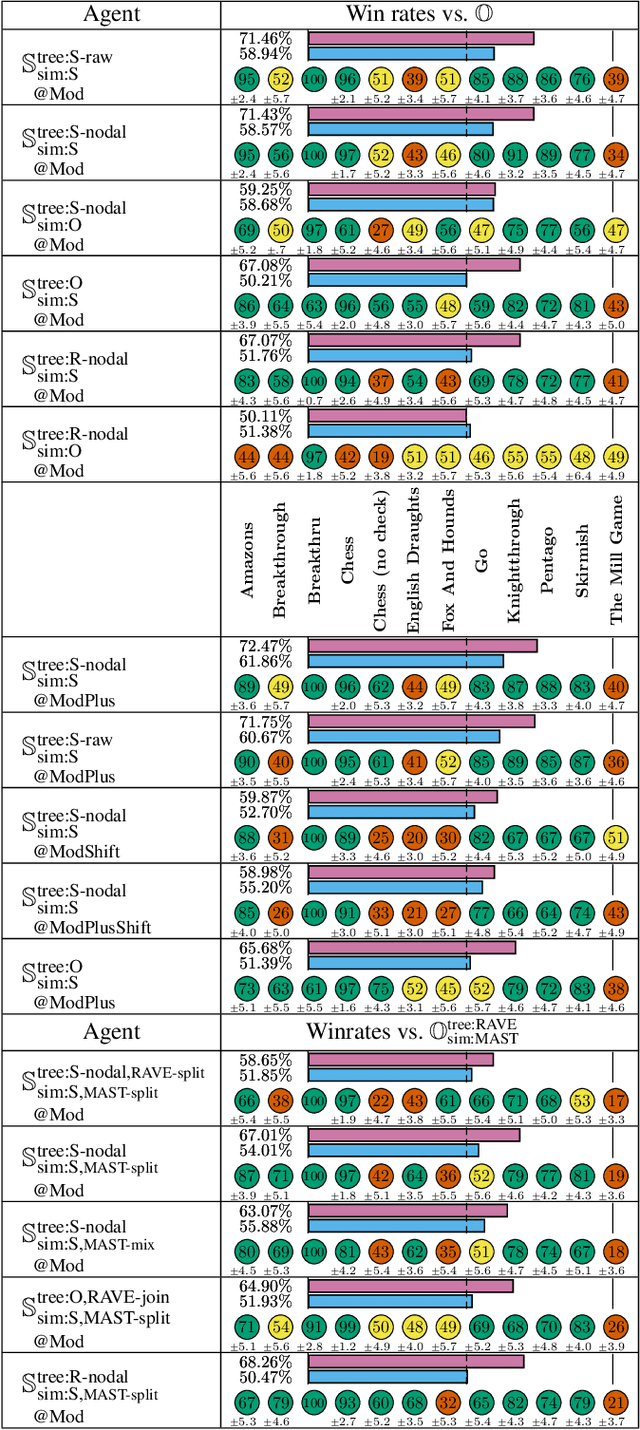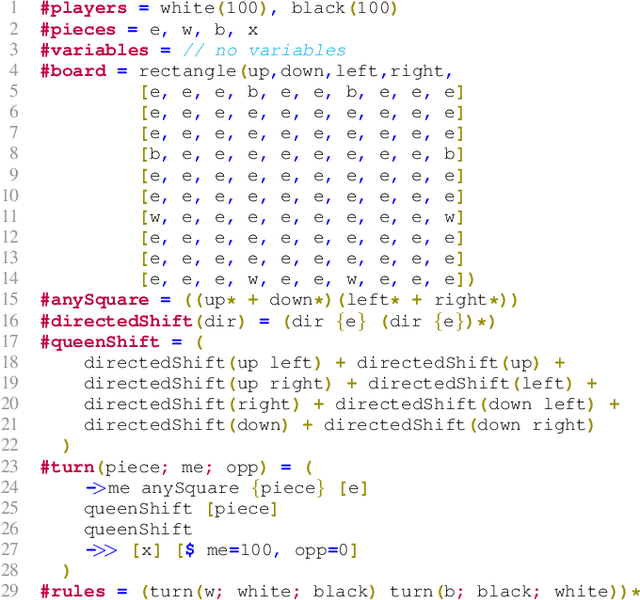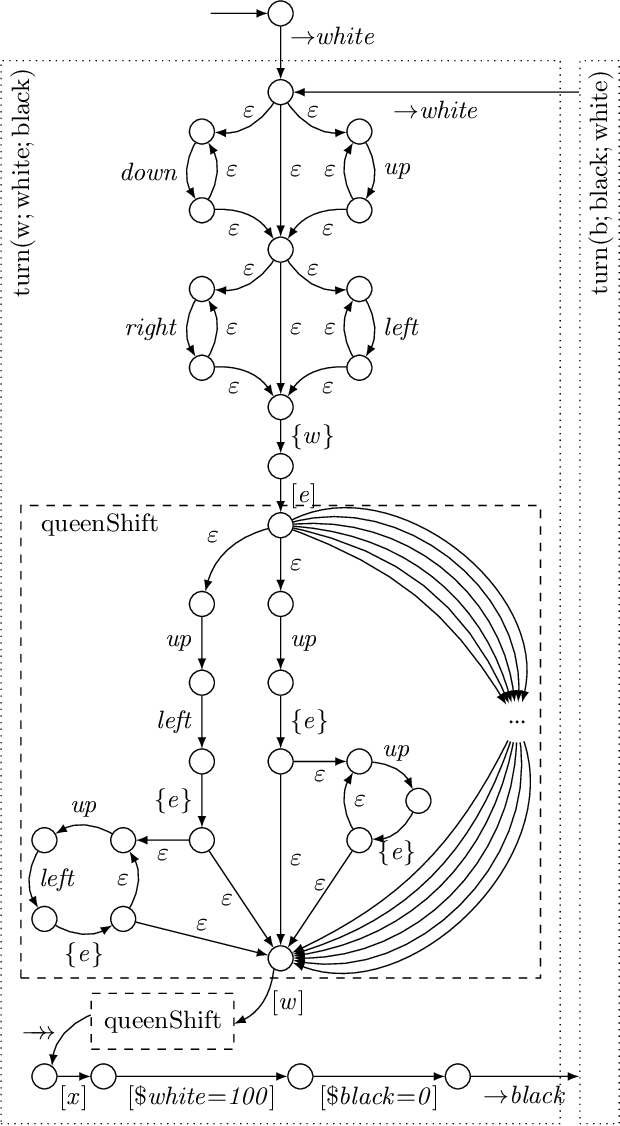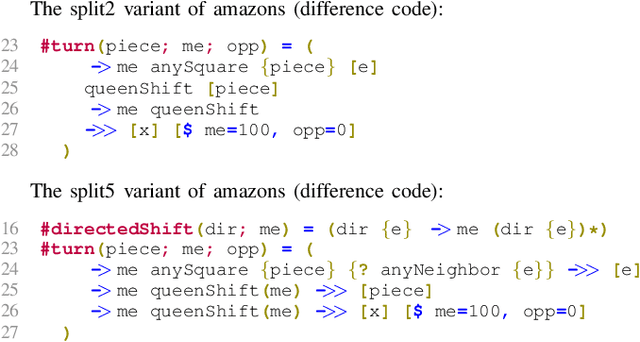Marek Szykuła
Regular Games -- an Automata-Based General Game Playing Language
Nov 13, 2025Abstract:We propose a new General Game Playing (GGP) system called Regular Games (RG). The main goal of RG is to be both computationally efficient and convenient for game design. The system consists of several languages. The core component is a low-level language that defines the rules by a finite automaton. It is minimal with only a few mechanisms, which makes it easy for automatic processing (by agents, analysis, optimization, etc.). The language is universal for the class of all finite turn-based games with imperfect information. Higher-level languages are introduced for game design (by humans or Procedural Content Generation), which are eventually translated to a low-level language. RG generates faster forward models than the current state of the art, beating other GGP systems (Regular Boardgames, Ludii) in terms of efficiency. Additionally, RG's ecosystem includes an editor with LSP, automaton visualization, benchmarking tools, and a debugger of game description transformations.
Fast and Knowledge-Free Deep Learning for General Game Playing
Dec 21, 2023Abstract:We develop a method of adapting the AlphaZero model to General Game Playing (GGP) that focuses on faster model generation and requires less knowledge to be extracted from the game rules. The dataset generation uses MCTS playing instead of self-play; only the value network is used, and attention layers replace the convolutional ones. This allows us to abandon any assumptions about the action space and board topology. We implement the method within the Regular Boardgames GGP system and show that we can build models outperforming the UCT baseline for most games efficiently.
Split Moves for Monte-Carlo Tree Search
Dec 14, 2021



Abstract:In many games, moves consist of several decisions made by the player. These decisions can be viewed as separate moves, which is already a common practice in multi-action games for efficiency reasons. Such division of a player move into a sequence of simpler / lower level moves is called \emph{splitting}. So far, split moves have been applied only in forementioned straightforward cases, and furthermore, there was almost no study revealing its impact on agents' playing strength. Taking the knowledge-free perspective, we aim to answer how to effectively use split moves within Monte-Carlo Tree Search (MCTS) and what is the practical impact of split design on agents' strength. This paper proposes a generalization of MCTS that works with arbitrarily split moves. We design several variations of the algorithm and try to measure the impact of split moves separately on efficiency, quality of MCTS, simulations, and action-based heuristics. The tests are carried out on a set of board games and performed using the Regular Boardgames General Game Playing formalism, where split strategies of different granularity can be automatically derived based on an abstract description of the game. The results give an overview of the behavior of agents using split design in different ways. We conclude that split design can be greatly beneficial for single- as well as multi-action games.
Efficient Reasoning in Regular Boardgames
Jun 15, 2020



Abstract:We present the technical side of reasoning in Regular Boardgames (RBG) language -- a universal General Game Playing (GGP) formalism for the class of finite deterministic games with perfect information, encoding rules in the form of regular expressions. RBG serves as a research tool that aims to aid in the development of generalized algorithms for knowledge inference, analysis, generation, learning, and playing games. In all these tasks, both generality and efficiency are important. In the first part, this paper describes optimizations used by the RBG compiler. The impact of these optimizations ranges from 1.7 to even 33-fold efficiency improvement when measuring the number of possible game playouts per second. Then, we perform an in-depth efficiency comparison with three other modern GGP systems (GDL, Ludii, Ai Ai). We also include our own highly optimized game-specific reasoners to provide a point of reference of the maximum speed. Our experiments show that RBG is currently the fastest among the abstract general game playing languages, and its efficiency can be competitive to common interface-based systems that rely on handcrafted game-specific implementations. Finally, we discuss some issues and methodology of computing benchmarks like this.
Experimental Studies in General Game Playing: An Experience Report
Mar 06, 2020
Abstract:We describe nearly fifteen years of General Game Playing experimental research history in the context of reproducibility and fairness of comparisons between various GGP agents and systems designed to play games described by different formalisms. We think our survey may provide an interesting perspective of how chaotic methods were allowed when nothing better was possible. Finally, from our experience-based view, we would like to propose a few recommendations of how such specific heterogeneous branch of research should be handled appropriately in the future. The goal of this note is to point out common difficulties and problems in the experimental research in the area. We hope that our recommendations will help in avoiding them in future works and allow more fair and reproducible comparisons.
A note on the empirical comparison of RBG and Ludii
Oct 04, 2019
Abstract:We present an experimental comparison of the efficiency of three General Game Playing systems in their current versions: Regular Boardgames (RBG 1.0), Ludii~0.3.0, and a Game Description Language (GDL) propnet. We show that in general, RBG is currently the fastest GGP system. For example, for chess, we demonstrate that RBG is about 37 times faster than Ludii, and Ludii is about 3 times slower than a GDL propnet. Referring to the recent comparison [An Empirical Evaluation of Two General Game Systems: Ludii and RBG, CoG 2019], we show evidences that the benchmark presented there contains a number of significant flaws that lead to wrong conclusions.
Regular Boardgames
Jun 08, 2017Abstract:We present an initial version of Regular Boardgames general game description language. This stands as an extension of Simplified Boardgames language. Our language is designed to be able to express the rules of a majority of popular boardgames including the complex rules such as promotions, castling, en passant, jump captures, liberty captures, and obligatory moves. The language describes all the above through one consistent general mechanism based on regular expressions, without using exceptions or ad hoc rules.
Simplified Boardgames
Jul 15, 2016

Abstract:We formalize Simplified Boardgames language, which describes a subclass of arbitrary board games. The language structure is based on the regular expressions, which makes the rules easily machine-processable while keeping the rules concise and fairly human-readable.
Procedural Content Generation for GDL Descriptions of Simplified Boardgames
Aug 02, 2015Abstract:We present initial research towards procedural generation of Simplified Boardgames and translating them into an efficient GDL code. This is a step towards establishing Simplified Boardgames as a comparison class for General Game Playing agents. To generate playable, human readable, and balanced chess-like games we use an adaptive evolutionary algorithm with the fitness function based on simulated playouts. In future, we plan to use the proposed method to diversify and extend the set of GGP tournament games by those with fully automatically generated rules.
 Add to Chrome
Add to Chrome Add to Firefox
Add to Firefox Add to Edge
Add to Edge